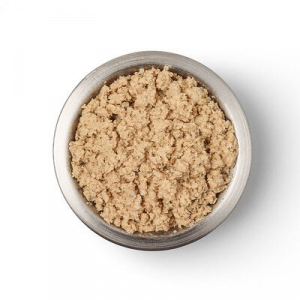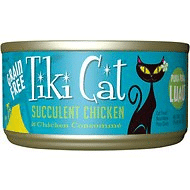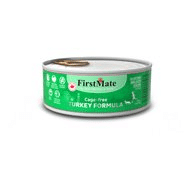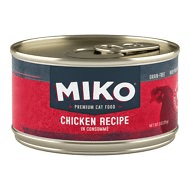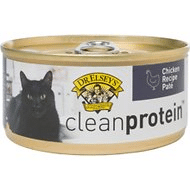Best Cat Food Without Carrageenan
Quick Guide
- What is the Best Cat Food without Carrageenan?
- Carrageenan in Cat Food
- Why is carrageenan so controversial and can it harm your cat?
- Top 5 Best Cat Foods without Carrageenan
- JustCats Fish & Chicken
- Tiki Cat Puka Puka Luau Succulent Chicken in Chicken Consomme Grain-Free Canned Cat Food Review
- First Mate Turkey Formula Limited Ingredient Grain-Free Canned Cat Food Review
- Miko Chicken Recipe in Consomme Grain-Free Cat Food Review
- Dr. Elsey’s cleanprotein Chicken Formula Grain-Free Canned Cat Food
- NomNomNow Chicken Chow Meow Cat Food Review
- Other Brands that Refuse to Use Carrageenan
Carrageenan is a popular food additive derived from red seaweed. When cooked, it has a gelatinous texture that makes it an excellent stabilizer, emulsifier, and thickener. It’s used to improve the texture of a wide array of products. In cat food, it’s used to give wet foods a smooth, creamy texture.
Some argue that the widespread use of food-grade carrageenan is responsible for cancer, inflammatory bowel disease, and other inflammatory diseases.
You might have already decided that carrageenan is something you’d like to avoid in your cat’s food. Carrageenan can be hard to identify, so we have made it easier by identifying where it might be hiding in your pet’s food, as well as highlighting some foods that we are sure don’t have carrageenan.
What is the Best Cat Food without Carrageenan?
- JustCats Fish & Chicken
- Tiki Cat Puka Puka Luau Succulent Chicken Grain-Free Canned Cat Food
- First Mate Turkey Limited Ingredient Grain-Free Canned Cat Food
- Miko Chicken Recipe in Consomme Grain-Free Cat Food
- Dr. Elsey’s cleanprotein Chicken Formula Grain-Free Canned Cat Food
- NomNomNow Chicken Chow Meow Cat Food
Carrageenan in Cat Food
As we said above, carrageenan is a food additive derived from red seaweed. When carrageenan is cooked, it has a gelatinous texture that makes it an excellent stabilizer, emulsifier, and thickener. It’s used to improve the texture of a wide array of products. In cat food, it’s used to give wet foods a smooth, creamy texture.
Carrageenan goes by many different names and might be lurking in your cat’s food without your knowledge. You may find it listed on cat food labels as any of the following:
- Algas
- Algue Rouge Marine
- Chondrus crispus
- Chondrus Extract
- Euchema species
- Irish Moss Algae
- Red Marine Algae
Why is carrageenan so controversial and can it harm your cat?
Since the 1960’s, the dangers of carrageenan have been observed, discussed, and disputed. While it’s been confirmed that one form of carrageenan causes inflammation, the other form is approved for use in food and is a popular additive in products for both pets and people. Yet its safety isn’t beyond question. Some argue that the widespread use of food-grade carrageenan is responsible for cancer, inflammatory bowel disease, and other inflammatory diseases.
To fully understand the carrageenan problem, you need to know about the two types of carrageenan and the history of carrageenan research.
Degraded vs. Non-Degraded Carrageenan
Degraded carrageenan is derived from seaweed that’s been processed with alkali and degraded to a low molecular weight. The resulting product is commonly called degraded carrageenan or poligeenan. No one argues that degraded carrageenan is an inflammatory agent. The medical research community has used degraded carrageenan for decades to induce inflammation. Lab animals are injected with it to test experimental trials of anti-inflammatory drugs.
Degraded carrageenan is considered a possible human carcinogen by the International Agency for Research on Cancer and is prohibited in food products.
Undegraded carrageenan, however, is approved for use in food and is generally considered safe. That said, the division between degraded and undegraded carrageenan isn’t always clean or clear. When an industry trade group assembled a working group to determine how much degraded carrageenan was present in samples of food-grade carrageenan, levels varied widely depending on which lab performed the testing. Most labs found at least traces of degraded carrageenan and one test showed that the food-grade carrageenan was, in fact, 25% degraded carrageenan.
And degraded carrageenan may not be the only concern. Several studies appear to demonstrate that food-grade carrageenan is linked to inflammation. According to the Cornucopia Institute’s “Organic Watergate White Paper”, a study published in Cancer Research found that “The undegraded carrageenan in the diet had an enhancing effect in colorectal carcinogenesis in rats.”
Ultimately, the jury is still out on the inflammatory effects of food-grade carrageenan, but the evidence suggests that it’s an additive worth avoiding. With so many foods available that don’t contain carrageenan, avoiding the risk is both prudent and easy to do.
Top 5 Best Cat Foods without Carrageenan
Four out of five of these cat foods were not made with any thickeners or stabilizers at all, so if you’re looking for a cat food without carrageenan or guar gum and other thickeners, this is the list for you.
In addition to not containing carrageenan, these foods reflect your cat’s natural dietary needs. They feature significant amounts of animal-sourced protein and minimal plant matter. They’re made without any artificial colors, flavors, or preservatives that might cause harm over time.
JustCats Fish & Chicken
Rating: 5 out of 5 stars
First 5 Ingredients: Alaskan Pacific Wild-Caught Cod, Whole Atlantic Sardines, Dried Yuca Root, Chicken Thighs, Chicken Hearts
JustCats Fish & Chicken recipe is a high-protein, low-carbohydrate diet that’s perfect for adult cats of all breeds. This nutritionally balanced cat food contains yuca root to absorb and retain moisture, to help ensure your cat is always fully hydrated. Yuca root is also highly digestible, something that is very important for cats with pancreatitis. It is made with human-grade ingredients and the main source of protein is Alaskan Pacific wild-caught cod. Cod is low-calorie and a good source of omega-3 fatty acids, niacin, vitamin B12 & B6, potassium, phosphorus, and selenium. Cat food that contains easily digestible EFAs, like those in fish, helps contribute to a healthy, shiny coat. If you choose this food for your cat, you can have peace of mind knowing that it is formulated to meet the nutritional levels established by the AAFCO Cat Food Nutrient Profiles for maintenance.
Pros
- Fresh, human-grade ingredients
- Made by hand
- Veterinarian-backed nutrition consultants
- High protein content
Cons
- Can be more expensive than other cat food options
Tiki Cat Puka Puka Luau Succulent Chicken in Chicken Consomme Grain-Free Canned Cat Food Review
Rating: 5 out of 5 stars
First 5 Ingredients: Chicken, Chicken Broth, Sunflower Seed Oil, Tricalcium Phosphate, Taurine
Not all of Tiki Cat foods are carrageenan-free, but Puka Puka Luau and some other recipes are. This particular formula features chicken as the primary ingredient. The chicken meat is shredded and set in a simple, unthickened broth enriched with sunflower seed oil and added vitamins, minerals, and amino acids.
While sunflower seed oil doesn’t fit into a strictly carnivorous menu, the food is generally meat-focused with virtually zero plant ingredients and extremely low carbohydrate content. – Buy It
Pros
- Primarily made from nourishing chicken meat
- Free from carrageenan and other thickeners
- Simple recipe is a good choice for cats with food sensitivities
- Low in plant ingredients
Cons
- Contains sunflower seed oil, which isn’t the most species-appropriate fat source
First Mate Turkey Formula Limited Ingredient Grain-Free Canned Cat Food Review
Rating: 4.5 out of 5 stars
First 5 Ingredients: Boneless Turkey, Water Sufficient for Processing, Potato, Chicken Liver, Calcium Carbonate
FirstMate is one of the few brands that doesn’t use thickeners in any of their products.
Because it lacks any thickening agents, this food has a looser texture than the average pate. The company describes it as similar to applesauce.
The recipe features turkey, chicken liver, and potato in addition to the standard array of vitamins and amino acids. The protein is primarily sourced from animal ingredients with 96% of the total protein from free-run poultry and the remaining 4% coming from vegetable ingredients.
The food is manufactured in the company’s own facility in British Columbia. – Buy It
Pros
- A great option for cats who prefer pate-style foods
- Free from any thickeners
- Made primarily from animal ingredients
- Rich in animal-sourced protein
Cons
- Contains potato
Miko Chicken Recipe in Consomme Grain-Free Cat Food Review
Rating: 5 out of 5 stars
First 5 Ingredients: Chicken, Chicken Broth, Sunflower Oil, Potassium Chloride, Tricalcium Phosphate
Miko is a Chewy house brand offering a small line of wet cat foods. All of these foods are free of carrageenan, nor do they contain any grains, corn, wheat, soy, or starches. This chicken cat food has a simple recipe similar to those offered by Tiki Cat. It contains nothing but chicken, chicken broth, sunflower oil, and vitamins, minerals, and amino acids.
Chewy is currently offering 50% off your first order of Miko food. – Buy It
Pros
- Free from carrageenan and other thickening agents
- Made primarily from species-appropriate, protein-rich chicken
- A high-moisture, nourishing recipe
Cons
- Miko offers a relatively limited selection of foods and may not be appropriate for cats with allergies or food sensitivities
- Contains sunflower seed oil, which isn’t the most species-appropriate fat source
Dr. Elsey’s cleanprotein Chicken Formula Grain-Free Canned Cat Food
Rating: 4 out of 5 stars
First 5 Ingredients: Chicken, Chicken Broth, Chicken Liver, Dried Egg Product, Natural Flavor
This food from Dr. Elsey’s cleanprotein is a highly-appetizing pate made with chicken, chicken liver, and “natural flavor” for added palatability. Thanks to its minimal plant content, this food is 4% carbohydrates, meaning that it’s low-carb enough for cats with diabetes and anyone who wants to avoid starch.
This is the only recipe on this list that contains any gums or thickeners. It contains agar-agar, which is a gelatinous thickener derived from red algae. While similar to carrageenan, agar-agar is chemically different and lacks carrageenan’s inflammatory reputation. – Buy It
Pros
- Free from carrageenan
- Low in carbohydrates
- Rich in nourishing animal ingredients
Cons
- Expensive
- Agar-agar is an unnecessary ingredient
NomNomNow Chicken Chow Meow Cat Food Review
Rating: 4 out of 5 stars
First 5 Ingredients: Chicken Breast, Thigh, and Liver, Asparagus, Carrot, Spinach, Cantaloupe
NomNomNow cat food is free from binders and thickeners. It’s a homemade-style food with a moist, flaky texture. If your cat likes to eat baked or boiled chicken meat as a treat, they’ll probably like the natural texture and taste of this food.
NomNomNow is made primarily from fresh, human-grade chicken. Though fruits and vegetables take up space on the ingredient list, the food is only about 10% carbohydrate.
Note that NomNomNow is not your traditional cat food. It’s a cat food subscription service that allows you to receive monthly or weekly deliveries of fresh cat food. The food is made in small batches in the company’s human-grade kitchen, portioned out according to your cat’s needs, and then shipped fresh to your house. – Buy It
Pros
- Convenient meal delivery service
- Human-grade food
- Primarily made from fresh chicken meat and liver
- Free from carrageenan and other thickeners
Cons
- Contains multiple plant ingredients
- One of the most expensive foods on the market
Other Brands that Refuse to Use Carrageenan
In addition to the products listed above, here’s a list of cat food brands and lines that don’t use carrageenan. The companies may change their formulations at any time, so check the food maker’s site to confirm the absence of carrageenan before you make a purchase.
- Nature’s Logic
- Nature’s Variety Instinct
- Blue Buffalo Healthy Gourmet
- Blue Wilderness Wild Delights
- Blue Bistro
- Petcurean
- Avoderm Natural
- Kasiks
- Weruva
- Petropics
- Fromm Four Star Grain-Free
- Newman’s Own Organics Grain-Free
- Lotus
- Taste of the Wild
- Ziwi Peak


